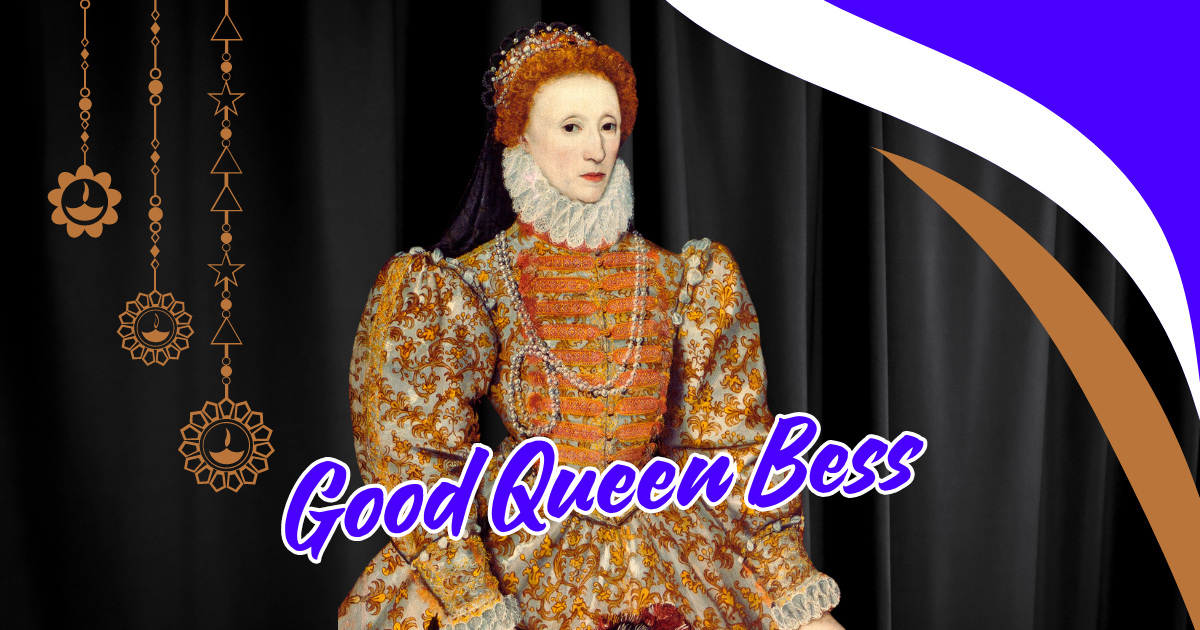Good Queen Bess, a name that has echoed through the centuries, refers to Queen Elizabeth I of England, one of the most remarkable rulers in British history. Known for her intelligence, resilience, and visionary leadership, Queen Elizabeth I reigned for 45 years, guiding England through a period of prosperity and stability. Her reign, often referred to as the Elizabethan Era, marked a Golden Age in English history, characterized by economic growth, cultural flourishing, and political strength.
In this post, we will delve into the top 5 achievements of Good Queen Bess and explore how her leadership shaped the course of English history, solidifying her legacy as one of the greatest monarchs in European history.
1. Who Was Good Queen Bess?
Good Queen Bess was the affectionate nickname given to Elizabeth I of England, who ruled from 1558 to 1603. The daughter of King Henry VIII and Anne Boleyn, Elizabeth ascended the throne at a time of great religious turmoil and political instability. Her reign came after the brief, tumultuous rule of her half-sister Mary I, during which England was embroiled in religious conflict and economic difficulties.
Despite these challenges, Queen Elizabeth I proved to be a formidable leader. Her reign is often regarded as a period of relative peace and prosperity, especially when compared to the turbulence that preceded and followed it. Elizabeth was not only known for her political acumen but also for her cultural patronage and her role in fostering the English Renaissance.
The name Good Queen Bess reflects the admiration and loyalty she inspired in her subjects. Elizabeth was widely viewed as a queen who genuinely cared for her people, balancing strength and diplomacy with compassion and pragmatism.
2. Top 5 Achievements of Good Queen Bess That Shaped History
Queen Elizabeth I‘s reign was filled with significant accomplishments that transformed England into a major European power. Here are the top 5 achievements of Good Queen Bess that had a lasting impact on both England and the world.
1. The Defeat of the Spanish Armada
- One of the most iconic moments of Elizabeth’s reign was the defeat of the Spanish Armada in 1588. At the time, Spain was the dominant naval power in Europe, and King Philip II sought to overthrow Elizabeth and restore Catholicism to England. However, under Elizabeth’s leadership and the brilliant tactics of her navy, the English fleet successfully defeated the Armada, securing England’s independence and cementing its position as a growing maritime power.
2. Religious Settlement of 1559
- Elizabeth inherited a deeply divided country, torn between Catholicism and Protestantism. To maintain stability, she enacted the Religious Settlement of 1559, which established the Church of England and set a moderate form of Protestantism as the national religion. This compromise helped ease religious tensions, allowing England to avoid the devastating religious wars that plagued much of Europe during this period.
3. Expansion of English Exploration
- Under Elizabeth’s reign, England entered a new era of exploration and colonial expansion. Notable explorers such as Sir Francis Drake and Sir Walter Raleigh embarked on voyages that expanded England’s influence across the globe. Elizabeth supported these expeditions, leading to the establishment of the first English colonies in the Americas and paving the way for England’s future empire.
4. Cultural Renaissance and the Arts
- The Elizabethan Era is renowned for its cultural achievements, particularly in literature and the arts. Elizabeth was a great patron of the arts, and her court became a vibrant center of culture. This period saw the rise of William Shakespeare, Christopher Marlowe, and other literary giants, as well as advancements in theater, music, and visual arts. The flourishing of the arts during her reign contributed to the lasting cultural legacy of the Elizabethan Age.
5. Strengthening of the English Economy
- Elizabeth’s reign brought about significant economic reforms that helped stabilize the English economy. Through careful financial management, she reduced the national debt, encouraged trade, and supported the growth of industries such as wool production. Her policies laid the groundwork for England’s future economic prosperity and contributed to the rise of the middle class.
These achievements were pivotal in transforming England from a relatively small European power into a nation poised for greatness on the global stage.
3. Why Was Queen Elizabeth I Called Good Queen Bess?
The nickname Good Queen Bess was not just a title of affection but a reflection of Elizabeth’s strong bond with her people. Several factors contributed to her earning this nickname:
1. Popularity with the People
Elizabeth was genuinely beloved by her subjects, who saw her as a wise and just ruler. She was known for her eloquent speeches and ability to connect with the common people, which helped her cultivate an image as a monarch who cared deeply about the welfare of her nation.
2. Her Long and Stable Reign
Elizabeth ruled for 45 years, one of the longest reigns in English history at the time. Her longevity on the throne provided a sense of stability that was sorely needed after years of upheaval under her predecessors. This period of relative peace and prosperity endeared her to the people, who appreciated her capable leadership.
3. Her Role as a Symbol of National Strength
Throughout her reign, Elizabeth was seen as a symbol of national unity and strength, particularly after the victory over the Spanish Armada. This triumph solidified her reputation as a leader who could protect England from foreign threats, further enhancing her popularity.
The combination of these factors made Elizabeth I widely respected and loved, giving rise to the nickname Good Queen Bess.
4. Elizabethan Era: A Golden Age Under Good Queen Bess
The reign of Good Queen Bess is often referred to as the Elizabethan Golden Age, a period of unprecedented cultural, political, and economic growth. Under her leadership, England experienced a renaissance that saw advancements in the arts, exploration, and science.
1. A Flourishing of the Arts
Elizabeth’s court was a hub for literature, theater, and music. Playwrights like William Shakespeare and Ben Jonson flourished under her patronage, producing works that continue to shape English literature. The establishment of theaters like the Globe Theatre provided a space for this burgeoning cultural expression.
2. Political Stability
Elizabeth’s political acumen helped stabilize the kingdom, avoiding the religious wars that ravaged much of Europe. Her middle-ground religious policies allowed for a level of tolerance that maintained peace and order during a time when other countries were embroiled in violent conflict.
3. Economic Expansion
Elizabeth’s support for trade and industry helped the economy grow, especially through the expansion of England’s global trade routes. The wool and textile industries flourished, while new markets were opened in the New World and the East Indies.
The Elizabethan Golden Age remains one of the most celebrated periods in English history, largely thanks to the visionary leadership of Good Queen Bess.
5. Good Queen Bess’ Foreign Policy: Navigating a Hostile World
Elizabeth I faced significant foreign threats throughout her reign, particularly from Spain and France, both of which were powerful Catholic nations opposed to her Protestant rule. However, her foreign policy was marked by a delicate balance of diplomacy, strategic alliances, and military strength.
1. The Spanish Armada
As mentioned earlier, one of Elizabeth’s greatest foreign policy successes was the defeat of the Spanish Armada. This victory was not only a military triumph but also a major diplomatic win, as it solidified England’s position as a rising naval power and thwarted Spain’s attempts to dominate Europe.
2. Strategic Diplomacy
Elizabeth was a master of diplomacy, often using her single status to her advantage by entertaining marriage proposals from foreign princes and kings. This allowed her to keep potential enemies at bay while maintaining alliances with other nations. Her ability to navigate the complex political landscape of Europe helped secure England’s safety during her reign.
3. Supporting Protestant Causes
Elizabeth also provided covert support to Protestant rebels in countries like the Netherlands and France, weakening the power of Catholic monarchs while expanding England’s influence. Her foreign policy ensured that England remained a key player in European politics despite its relatively small size and resources.
Through a combination of military strength, diplomacy, and strategic alliances, Good Queen Bess successfully defended her realm from external threats, securing England’s future on the world stage.
6. Leadership Lessons from Good Queen Bess: A Legacy of Strength and Wisdom
The leadership style of Good Queen Bess has been studied and admired for centuries. Her ability to navigate crises, balance conflicting interests, and maintain her power in a male-dominated world has made her an enduring symbol of strength and resilience.
1. Pragmatism
Elizabeth was known for her pragmatic approach to governance. She understood the importance of compromise, particularly in matters of religion and politics, and sought to find practical solutions to problems rather than rigidly adhering to ideology.
2. Strategic Communication
Elizabeth’s speeches, such as her famous address to the troops at Tilbury before the Armada, demonstrated her skill as a communicator. She inspired loyalty and confidence through her words, presenting herself as both a ruler and a servant of her people.
3. Balancing Power and Diplomacy
Elizabeth carefully balanced the power dynamics of her court, keeping rival factions in check while ensuring her advisors remained loyal. Her diplomatic skills extended not just to foreign nations but also to the complex relationships within her own kingdom.
By mastering these aspects of leadership, Good Queen Bess not only maintained her position as queen but also left behind a powerful legacy that continues to influence modern political thought.
Interested in exploring more fascinating historical figures and landmarks? Discover 5 Fascinating Facts About the History of Stewart Peak Warner NH here and uncover a hidden gem in New Hampshire’s rich past!
Conclusion: Why Good Queen Bess Is Still Celebrated Today
Good Queen Bess, or Queen Elizabeth I, left an indelible mark on English history. Her reign ushered in a period of stability, growth, and cultural enrichment that shaped the future of England for centuries to come. From her victory over the Spanish Armada to her support for the arts, Elizabeth’s achievements helped define an era and cement her status as one of the most iconic monarchs in history.
Today, Elizabeth I is still celebrated for her leadership, wisdom, and enduring legacy, making her a symbol of strength and resilience. The impact of Good Queen Bess continues to be felt, as she remains an inspiration to leaders and historians alike.
FAQs About Good Queen Bess
- Who was Good Queen Bess?
- Good Queen Bess was the nickname given to Queen Elizabeth I, who ruled England from 1558 to 1603 and was known for her strong leadership and the prosperity of the Elizabethan Era.
- Why was Elizabeth I called Good Queen Bess?
- Elizabeth earned the nickname Good Queen Bess because of her popularity with the people, her effective leadership, and her ability to maintain stability and prosperity in England.
- What were Queen Elizabeth I’s major achievements?
- Key achievements include the defeat of the Spanish Armada, the Religious Settlement of 1559, and her support for English exploration and the arts during the Elizabethan Renaissance.
- What was the Elizabethan Golden Age?
- The Elizabethan Golden Age refers to the period during Elizabeth I’s reign when England experienced cultural, economic, and political flourishing, particularly in the arts and exploration.
- Was Queen Elizabeth I a successful ruler?
- Yes, Elizabeth I is considered one of England’s greatest monarchs due to her ability to maintain political stability, strengthen England’s global influence, and foster a cultural renaissance.
- What was Queen Elizabeth I’s foreign policy?
- Elizabeth’s foreign policy involved strategic diplomacy, military strength, and support for Protestant causes to defend England from powerful Catholic nations like Spain and France.
- What impact did Queen Elizabeth I have on English exploration?
- Elizabeth I supported explorers like Sir Francis Drake and Sir Walter Raleigh, leading to the establishment of English colonies and expanding England’s influence in the New World.
- How long did Good Queen Bess reign?
- Elizabeth I reigned for 45 years, from 1558 to 1603, making her one of the longest-reigning monarchs in English history at the time.
- What was the Religious Settlement of 1559?
- The Religious Settlement established the Church of England and set a moderate form of Protestantism as the national religion, helping to ease religious tensions in England.
- What was Queen Elizabeth I’s legacy?
- Elizabeth I left behind a legacy of strength, wisdom, and cultural achievement, making her one of the most celebrated and influential monarchs in history.

Joseph Bush is a seasoned writer and researcher with over 7 years of experience covering a wide range of general topics, from lifestyle and technology to business and current events. He is dedicated to producing fact-checked, reader-friendly content that informs, engages, and empowers readers.
Throughout his career, Joseph has followed strict editorial guidelines, relied on reputable sources, and ensured every article meets the highest standards of accuracy and clarity. His expertise spans multiple fields, allowing him to explain complex topics in a way that’s easy to understand.
Passionate about continuous learning, Joseph stays updated on industry trends and best practices to deliver trustworthy, well-rounded insights. Readers can rely on his work for its credibility, depth, and real-world relevance.




